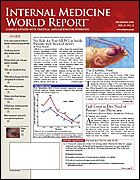Hyperglycemia at Admission in Patients with HF a Marker for Short-Term Mortality
Individuals who do not have diabetes but have high blood glucose values at the time they are admitted to a hospital because of heart failure (HF) are at significantly greater risk for dying early than those admitted with low blood glucose values.
Arch Intern Med
Although diabetes is a known harbinger of poor outcomes in HF patients, a new study has for the first time shown a connection between elevated blood glucose concentrations and worse prognoses in HF patients without diabetes (. 2006; 166:1613-1619).
Investigators analyzed data collected on 1122 nondiabetic patients who were hospitalized because of acute HF or an exacerbation of chronic HF. They were divided into tertiles according to blood glucose values at admission. Median levels were 92 mg/dL (range, 84-97 mg/dL) in the first tertile, 113 mg/dL (108-121 mg/dL) in the second, and 147 mg/dL (136-162 mg/dL) in the third.
The 1-year mortality rates were similar in all 3 groups, but in-hospital and 60-day mortality rates were significantly higher among patients in the third tertile (Table).
In-hospital mortality was 2.64 times more likely among patients in the third tertile than in the first. Adjusted analysis of continuous blood glucose concentration found that for each 18-mg/dL increase in admission blood glucose, the chances of in-hospital mortality increased by 31% and of 60-day mortality increased by 12%.
Results of subgroup analyses to account for potential confounders were similarly significant. Excluding patients with acute myocardial infarction, each 18-mg/dL increase in admission blood glucose translated into a 35% higher risk of in-hospital mortality and a 14% higher risk of 60-day mortality. Adjusting for left ventricular ejection fraction class left each 18-mg/dL increase in admission blood glucose increasing the chances of in-hospital mortality by 37% and of 60-day mortality by 12%.
The association between elevated admission blood glucose values and higher short-term mortality in nondiabetic patients hospitalized for HF is a “major new finding,” according to the investigators.
Noting that the association was independent of the factors traditionally associated with poor outcomes after HF (ie, age, hemoglobin value, renal function, and functional class), they write, “Our finding calls attention to a new prognostic marker that could be used for early risk stratification and management of patients with HF at hospital admission.”
IMWR
Study coauthor Jonathan Leor, MD, director, Neufeld Cardiac Research Institute, Tel-Aviv University, and Beer Sheba Medical Center, Israel, told , “While monitoring patients with chronic HF, detection of hyperglycemia is a marker for body stress and requires careful evaluation to detect worsening of cardiac or renal function and initiating appropriate therapy.”
The investigators caution that additional research is needed to determine whether hyperglycemia is a predictor or a cause of worse outcomes. “We don’t know whether aggressive therapy to normalize glucose level will improve outcome, but there is a biologic rationale for that,” Dr Leor said.
